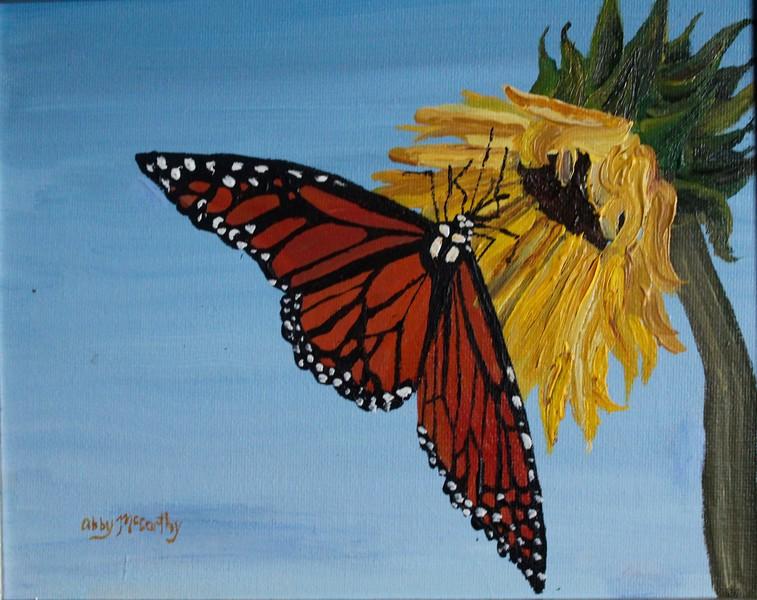Opinion: Bring the bees to your block
Pictured above is a painting of a pollinator and a flower done by Abby McCarthy. In this article, she advocates for the protection of bees and an increase in bee farms. “I want more bees in my neighborhood, and I want to help the bee population recover from colony collapse disorder,” McCarthy said.
December 13, 2016
Imagine if two-fifths of your friends died in one year. That would be pretty traumatic. According to CBC, in the year 2014 alone, two out of five honey bee colonies in the U.S. died. Believe it or not, bees are your friends, and you should be concerned about their deaths.
In addition to being cute and buzzy, bees are the most common pollinator in the U.S. Pollinators transport nectar from male to female flowers, allowing plants to reproduce. No pollinators would mean no apple-picking in the fall and no cherry on top of your sundae.
Butterflies, moths, bats, hummingbirds and other animals are all pollinators, but none are as productive or important to agriculture as bees. Without bees, one-third of the food on our plates would disappear, including many fruits, vegetables, nuts and grains. We need to support bees and address this problem before the biodiversity of our ecosystems is destroyed.
Right now, bees are losing their habitats to urbanization and agriculture. Many farms destroy fields where bees live to clear land for livestock or growing crops. Then farms spray chemical pesticides like neonicotinoids that devastate bee colonies.
Bees also suffer from parasites like the varroa mite that sucks fluid out of bees’ bodies, often spreading viruses in the process. An infestation of varroa mites can easily wipe out an entire colony of bees. This parasite contributes to colony collapse disorder, a phenomenon where worker bees vanish from their hives.
So what can we do to protect our bee friends? Many people have started buying organic fruits and vegetables — grown without pesticides that poison our bees and butterflies. Maryland even passed a law to ban commercial use of neonicotinoids. Many families plant organic “butterfly gardens” in their backyards with extra flowers in all colors to attract pollinators. Community gardens and rooftop farming make this solution feasible in the city.
Still, the most direct way to support bees is to maintain a bee hive. When you picture a beekeeper, you may think of an older, bearded man with a hundred-acre field in his backyard. Contrary to stereotypes, beekeepers are people of all genders and backgrounds, and beekeeping is gaining popularity in cities.
BBC News reports that bees tend to survive longer and produce more honey when living in urban areas. Honey and other products like beeswax incentivize beekeeping for the citizens of France. Many of the public buildings in Paris have hives on the roof, such as the Musée d’Orsay and the Palais Garnier. Parisians create high-quality honey and a safe urban haven for bees.
Unfortunately, not every city welcomes bees like Paris. Across the U.S. many cities and towns have banned beekeeping. Restrictions on beekeeping stem from fear and stereotypes about bees. Most people associate bees with the searing pain of a stinger. The reality is that bees sting rarely and only in self-defense; their relatives the wasp and hornet are the real perpetrators of merciless, repeated stinging. Bees are the scapegoat of the garden.
We need to share knowledge about the benefits of beekeeping so that more people will want bees in their neighborhood. Towns and cities should repeal legislation that restricts beekeeping and instead enact policies that reward beekeepers. In states like Florida, any person supporting a beehive on their land can apply for an agricultural certification that will reduce their property taxes. Sometimes money speaks louder than words.
I want more bees in my neighborhood, and I want to help the bee population recover from colony collapse disorder. I plan on using my backyard garden, my power as a consumer, and political advocacy to help the pollinators. Bees are complex creatures who deserve a home. It’s time to bring the bees to your block.
Opinion articles written by staff members represent their personal views. The opinions expressed do not necessarily represent WSPN as a publication.





![Last Wednesday, the Wayland School Committee gathered to discuss a number of topics regarding the health curriculum and Innovation Career Pathway course. Another large topic of conversation was the ways to potentially mitigate distracting cell phone usage. "These [phones] are going to distract your learning and social relationships," Superintendent David Fleishman said. "That's concrete right there."](https://waylandstudentpress.com/wp-content/uploads/2025/06/Screenshot-2025-06-04-at-9.49.31 PM-1200x886.png)



























![Troy Hoyt finishes the Boston Marathon, running for the Hoyt Foundation. T. Hoyt is the son of Hoyt Foundation CEO Russ Hoyt.
“[Running a marathon] might seem like a big thing, when it’s presented to you at first, but if you break it up and just keep telling yourself, “Yes, you can,” you can start chipping away at it. And before you know it, you’ll be running the whole 26 miles, and you won’t even think twice about it.” T. Hoyt said.](https://waylandstudentpress.com/wp-content/uploads/2025/04/C36E8761-1CBB-452E-9DF2-543EF7B1095E_1_105_c.jpeg)












































